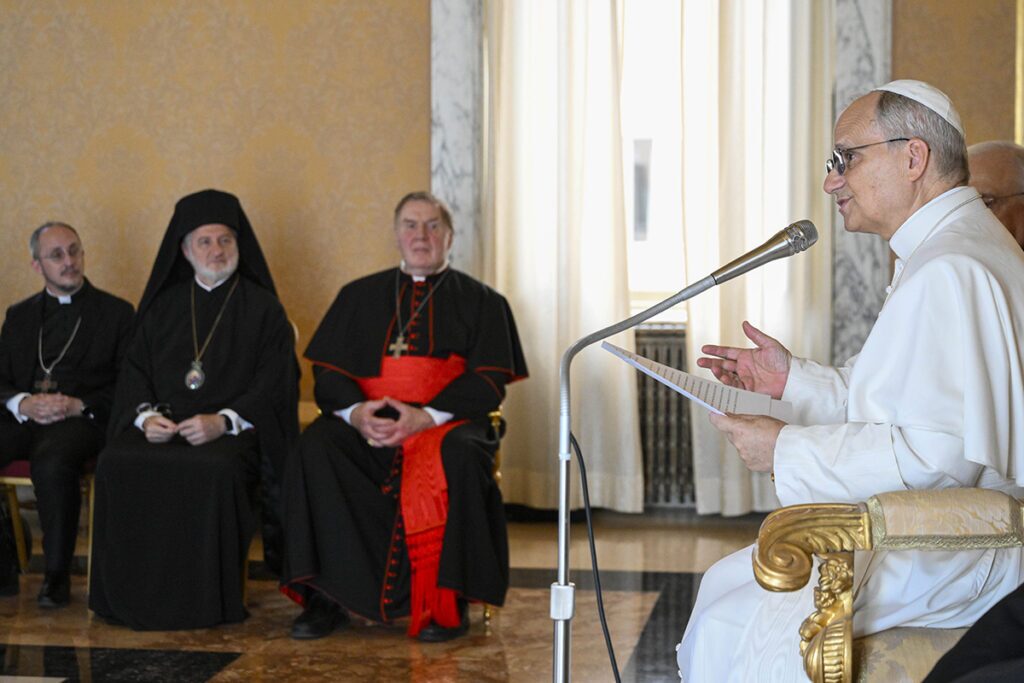VATICAN CITY (CNS) — The cry of innocent victims and mothers mourning their children will not go unheard, Pope Leo XIV said.
When Christians chant “the Easter Alleluia, ‘Christ is risen! He is truly risen!’ he said, “those words proclaim that the darkness of sin and death have been vanquished by the Lamb that was slain, Jesus Christ our Lord.”
“This inspires us with great hope, for we know that no cry of the innocent victims of violence, no lament of mothers mourning their children will go unheard,” he told U.S. visitors taking part in an ecumenical pilgrimage.
“Our hope is in God, yet precisely because we constantly draw from the inexhaustible source of his grace, we are called to be witnesses and bearers of hope,” he told them during an audience with the group at his residence at the papal villa in Castel Gandolfo July 17. The Vatican press hall released a copy of the speech the same day.
The group of U.S. pilgrims was led by Greek Orthodox Archbishop Elpidophoros of America and Cardinal Joseph W. Tobin of Newark, New Jersey. Cardinal Tobin is co-chairman of the North American Orthodox-Catholic Theological Consultation.
The group of about 50 Greek Orthodox, Byzantine Catholic and Roman Catholic faithful arrived in Rome July 15 for a nine-day pilgrimage to Rome, Istanbul — formerly known as Constantinople — and Iznik, Turkey, site of the ancient city of Nicaea. The journey commemorates both the Holy Year dedicated to hope and the 1700th anniversary of the Council of Nicaea.
Once in Constantinople, “I ask you to bring greetings and my embrace of peace to my venerable brother Patriarch Bartholomew, who so kindly attended the Holy Mass for the inauguration of my pontificate,” Pope Leo told the group.
“I hope to be able to meet you again, in a few months, to take part in the ecumenical commemoration of the anniversary of the Council of Nicaea,” he added. The late Pope Francis had been planning to travel to Iznik to commemorate the anniversary with Orthodox Ecumenical Patriarch Bartholomew of Constantinople. A Vatican official had said in May that planning was underway for Pope Leo to make the trip.
“Rome, Constantinople and all the other sees are not called to vie for primacy, lest we risk finding ourselves like the disciples who, along the way, even as Jesus was announcing his coming passion, argued about which of them was the greatest,” Pope Leo said.

The Nicene Creed, which was adopted by the fathers at the council, is a “symbol of faith,” he said, and, “together with the additions made at the Council of Constantinople in 381,” the Nicene-Constantinopolitan Creed is “the common patrimony of all Christians.”
He told the group, “You have set out from the United States, my native country, on this journey which is meant to be a return to the sources, to the places and the memorials of the Apostles Peter and Paul in Rome, and of the Apostle Andrew in Constantinople.”
Their pilgrimage is also “a way to experience anew and in a concrete way the faith that comes from hearing the Gospel handed down to us by the apostles,” he said.
“Spiritually, all of us need to return to Jerusalem, the city of peace, where Peter, Andrew and all the apostles, after the days of the Lord’s passion and resurrection, received the Holy Spirit at Pentecost, and from there bore witness to Christ to the ends of the earth,” he said.
“May our return to the roots of our faith make all of us experience the gift of God’s consolation and make us capable, like the good Samaritan, of pouring out the oil of consolation and the wine of gladness on today’s humanity,” he added.




